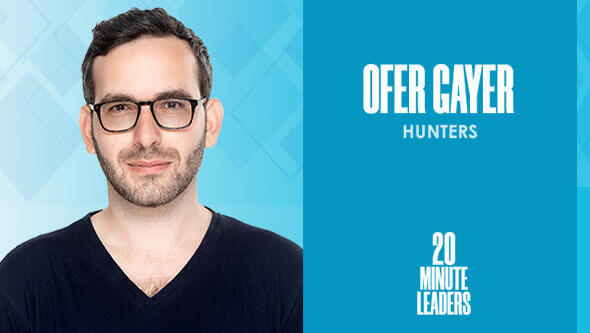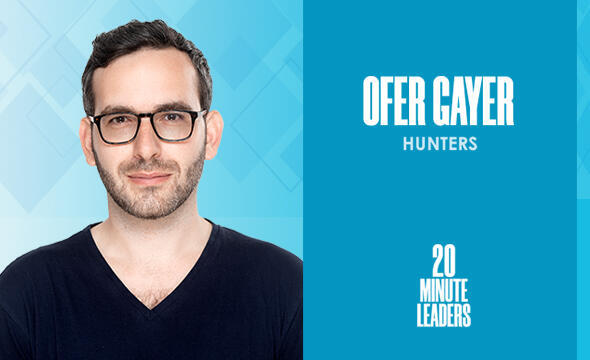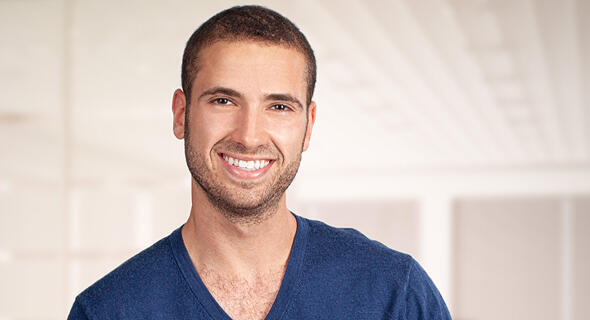
20-Minute Leaders
“I really like to move away from my comfort zone as much as possible.”
Each stage of his career has taken vice president of product at Hunters Ofer Gayer out of his comfort zone, something he enjoys.
Each stage of his career has taken Ofer Gayer out of his comfort zone, something he enjoys. Now the vice president of product at Hunters, he did intelligence work in the military and then was a security researcher. But he thought going deep in one area limited the impact he could have in the company, so he was drawn to product as a way to create more impact. Gayer shares that he sees product management as connecting the dots for customers and engineers so everyone has more understanding and excitement. He says that security products are behind other verticals in ease of use, and the products that make things easiest for the customer will be most successful. Gayer explains that even security experts can’t keep up with all areas of the field, and it is a good challenge to distill all the information down for the average person to use.
Click Here For More 20MinuteLeaders
I'm excited to understand your journey within product, abroad and in Israel, and also product within security and what that is like.
I was having fun in the military. It's always interesting, intelligence work. But I was like, "I want to see what's out there." I really like to move away from my comfort zone as much as possible over time. I joined a company called Incapsula pretty early on as a security researcher. After a couple of years, I moved into more senior roles. When I relocated shortly after I moved into product management, I really fell in love with the business side.
What really made that shift for you?
I love security research. But I felt like I wanted to create a bigger impact for the company. I always felt like there's some ceiling in the type of impact you can do when you’re only looking super deep in one area. Product really gave me that ability to drive a lot more impact. I also felt like I have some advantage because I am able to talk security and business.
Looking back now, are you able to distill what was it that captured you?
What I really love is these moments of absolute clarity, when something just clicks and you're able to crack something. Like, this is where the market is going, this is what customers don't understand, or this is what our engineering doesn't get, and I'm able to connect dots for other people and then they understand something they hadn't. This is how I see the job of product management at all levels: being able to connect the dots for people, make them excited, and see the light about something.
If we're diving into product within security, is that dramatically different than in other verticals?
Yeah, definitely. One aspect is the type of expectation that users have from a security product. They usually think of something that's super tech savvy and complicated. But what I've come to realize is security is just lagging behind just the rest of the product world in just making things simple and easy to use. We're definitely not doing a great job in a lot of products that just make the product easy. The products that are able to make the job easy for that customer are the ones that win. It doesn't matter if you have some amazing engine that you developed if your customers are unable to take advantage of it because it's just too complicated.
A friend who was one of the top researchers in some company said, "I thought that the most exciting thing and most important thing for a security company is to be able to find zero days. And if you don't find zero days, then what is it that you're doing?" But stage one, stage three, and zero days is something that's over the horizon for most customers. They're not even getting started with a lot of their security needs. That's kind of like an aha moment for a lot of security researchers that start working more with product and not just finding the bad guys in the coolest way.
If you're looking at bridging the gap between the world and research, how do you balance that and prioritize this into one coherent strategy?
What we look at is what our customers are trying to achieve and then figuring out what's the best way to help them achieve that in the easiest and the most predictable way. Customers, especially in the security space, really want someone to help them and say, "I know what the security threat is that you're trying to tackle. I have the recipe for how to tackle it.” And I'm very, "Let's focus on what matters the most to you, Customer, and have a very clear way to mitigate this risk." I think that is a very honest, candid approach to security versus having a little bit of everything but really you're not covering most of your attack surface.
It almost feels like today's cybersecurity platforms are making it easier for people with less experience to be able to resolve more within their organizations. Is this the right way to go about this?
I think it's a valid point. I do think that most products out there today just add another thing to look at, not necessarily make that thing simpler. Someone needs to help the end customer and say, "Hey, we're here to help and figure out all these different signals. Here's what it is." It's very hard for that person to be an expert. Nobody can be an expert on so many fields in security. I was pretty good in application security. If you asked me to reverse engineer a malware, I don't know how to do that. You can't just say, "As a company, we're going to focus on web application security." Because big companies have everything. How can we take that everything and distill it to something that's consumable by the average Joe or Jan, I think that's an amazing challenge to look at.
You had a unique experience doing product management back in California and back in Israel. You've experienced both sides now. What were some of your impressions?
I've been back for six months now, and I'm looking at things culturally in product that are different. In Israel, we have a huge tendency to go directly to solutions and we don't really learn to talk about the problem. We're like, "Let's go, go, go." But in product, our job first and foremost is to say, "Stop. Why, why, why?" So that creates an interesting contradiction or tension there.
Another thing is, when Israelis talk to North American customers, they don't pick up on the nuance of what the customer is actually telling them. They say, "Oh, we had a great conversation.” But maybe it was not very good at all. They were not happy. They're not going to tell you to your face, like an Israeli.
You have experienced PMs in Israel that have experienced it, but they don't understand maybe why. They will say, "Oh, this customer was annoying. They told me one thing, but...” It's just cultural differences. But if you live in the US and it surrounds you, you know, "Are there cues to pick up on?" versus an Israeli that is not really picking up on them.
People who are able to merge the cultures have a sort of superpower. Right?
Exactly. And you need to find the right altitude for the right phase of your company. Whatever works for you as a 10-person company probably doesn't work for 50 or for 150. Not a lot of Israeli companies really are doing well at above 500. A lot of execs come pouring in from the US sometimes to bridge that cultural gap.
Do you miss researching? Do you miss sitting down for days and weeks and slamming your head on the table and trying to figure out what is happening?
I don't miss that part. I sometimes miss just having the level of scientific clarity that I cracked something because PM has a lot of experience and you're working with a lot of unknowns. In research, there's a good dichotomy, like, "I was able to address that issue; I was able to crack that." Very clear cut. In PM, you can make a decision and you have a good gut feeling, but it’s always open-ended. It's a part of staying out of the comfort zone that I like so much.
Michael Matias, Forbes 30 Under 30, is the author of Age is Only an Int: Lessons I Learned as a Young Entrepreneur. He studies Artificial Intelligence at Stanford University, is a Venture Partner at J-Ventures and was an engineer at Hippo Insurance. Matias previously served as an officer in the 8200 unit. 20MinuteLeaders is a tech entrepreneurship interview series featuring one-on-one interviews with fascinating founders, innovators and thought leaders sharing their journeys and experiences.
Contributing editors: Michael Matias, Megan Ryan

